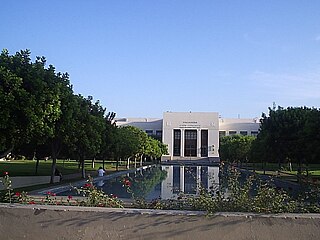
A community college is a type of educational institution. The term can have different meanings in different countries: many community colleges have an “open enrollment” for students who have graduated from high school. The term usually refers to a higher educational institution that provides workforce education and college transfer academic programs. Some institutions maintain athletic teams and dormitories similar to their university counterparts.

Higher education is an optional final stage of formal learning that occurs after completion of secondary education. Often delivered at universities, academies, colleges, seminaries, conservatories, and institutes of technology, higher education is also available through certain college-level institutions, including vocational schools, trade schools, and other career colleges that award academic degrees or professional certifications. Tertiary education at non-degree level is sometimes referred to as further education or continuing education as distinct from higher education. The right of access to higher education is mentioned in a number of international human rights instruments. The UN International Covenant on Economic, Social and Cultural Rights of 1966 declares, in Article 13, that "higher education shall be made equally accessible to all, on the basis of capacity, by every appropriate means, and in particular by the progressive introduction of free education". In Europe, Article 2 of the First Protocol to the European Convention on Human Rights, adopted in 1950, obliges all signatory parties to guarantee the right to education.

An apprenticeship is a system of training a new generation of practitioners of a trade or profession with on-the-job training and often some accompanying study. Apprenticeship also enables practitioners to gain a license to practice in a regulated profession. Most of their training is done while working for an employer who helps the apprentices learn their trade or profession, in exchange for their continued labor for an agreed period after they have achieved measurable competencies. Apprenticeships typically last 3 to 7 years. People who successfully complete an apprenticeship reach the "journeyman" or professional certification level of competence.
The Workforce Investment Act of 1998 was a United States federal law that was repealed and replaced by the 2014 Workforce Innovation and Opportunity Act.

TAFE South Australia provides vocational education and training in South Australia. The acronym TAFE stands for Technical and Further Education and is used and recognised nationally throughout Australia. TAFE SA is a Registered training organisation (RTO) under the jurisdiction of the Australian Skills Quality Authority (ASQA).
The Helpmann Academy was formed in 1994 as a partnership of the major tertiary arts training institutions in South Australia.
It brings together the skills and resources of South Australia's universities and TAFE SA, with courses in music, dance, drama, directing, visual arts, technical theatre production and design. It is named in honour of Sir Robert Helpmann, a famous Australian dancer.
Pennsylvania CareerLink is a collaborative project between multiple agencies to provide career services to Pennsylvania employers, potential employees, and others.
Science, Technology, Engineering and Mathematics (STEM), previously Science, Math, Engineering and Technology (SMET), is a term used to group together these academic disciplines. This term is typically used when addressing education policy and curriculum choices in schools to improve competitiveness in science and technology development. It has implications for workforce development, national security concerns and immigration policy.

The Technical Education and Skills Development Authority (TESDA) serves as the Philippines' Technical Vocational Education and Training (TVET) authority. As a government agency, TESDA is tasked to both manage and supervise the Philippines' Technical Education and Skills Development (TESD). Its goals are to develop the Filipino workforce with "world-class competence and positive work values" and to provide quality technical-educational and skills development through its direction, policies, and programs.
The Australian Minister for Industry, Innovation and Science was a portfolio in the Government of Australia between 1928, when the post was held by John Latham as the Minister for Industry, and 20 December 2017, when the last incumbent of the office was Senator The Hon. Arthur Sinodinos, since 24 January 2017.

New River Community and Technical College is a public community college in Beaver, West Virginia. It was founded July 1, 2003 and is West Virginia's newest college. The college was independently accredited February 8, 2005, by the Higher Learning Commission of the North Central Association of Colleges and Schools. Although newly founded and named, the college's origins span more than one hundred thirty years of service to West Virginia through its two parent institutions, Bluefield State College and Glenville State College.
Brian 'Bucky' Cunningham is a former Australian rules footballer in the South Australian National Football League, playing for the Port Adelaide. Cunningham was later CEO of Port Adelaide.

Workforce Innovation in Regional Economic Development (WIRED) was a project of the United States Department of Labor. It provided a new approach to workforce and economic development. Through the WIRED model, regions integrated economic and workforce development activities to demonstrate that talent development can drive economic transformation in regional economies across the United States.

The Department for Education (DfE) is a department of Her Majesty's Government responsible for child protection, education, apprenticeships and wider skills in England.
Rowan–Cabarrus Community College (RCCC) is a large community college in Rowan County and Cabarrus County, North Carolina, USA. It is one of 58 colleges in the state-supported North Carolina Community College System.

The Workforce Innovation and Opportunity Act (WIOA) is a United States public law that replaced the previous Workforce Investment Act of 1998 (WIA) as the primary federal workforce development legislation to bring about increased coordination among federal workforce development and related programs.
The Department of State Development is a department of the Government of South Australia. The department was formed on 1 July 2014 out of the former DFEEST, DMITRE and select groups from a few other agencies including Arts South Australia.

The Australian Department of Education and Training is a department of the Government of Australia charged with the responsibility for national policies and programs that help Australians access quality and affordable early childhood education, school education, higher education, vocational education and training, international education and academic research.











